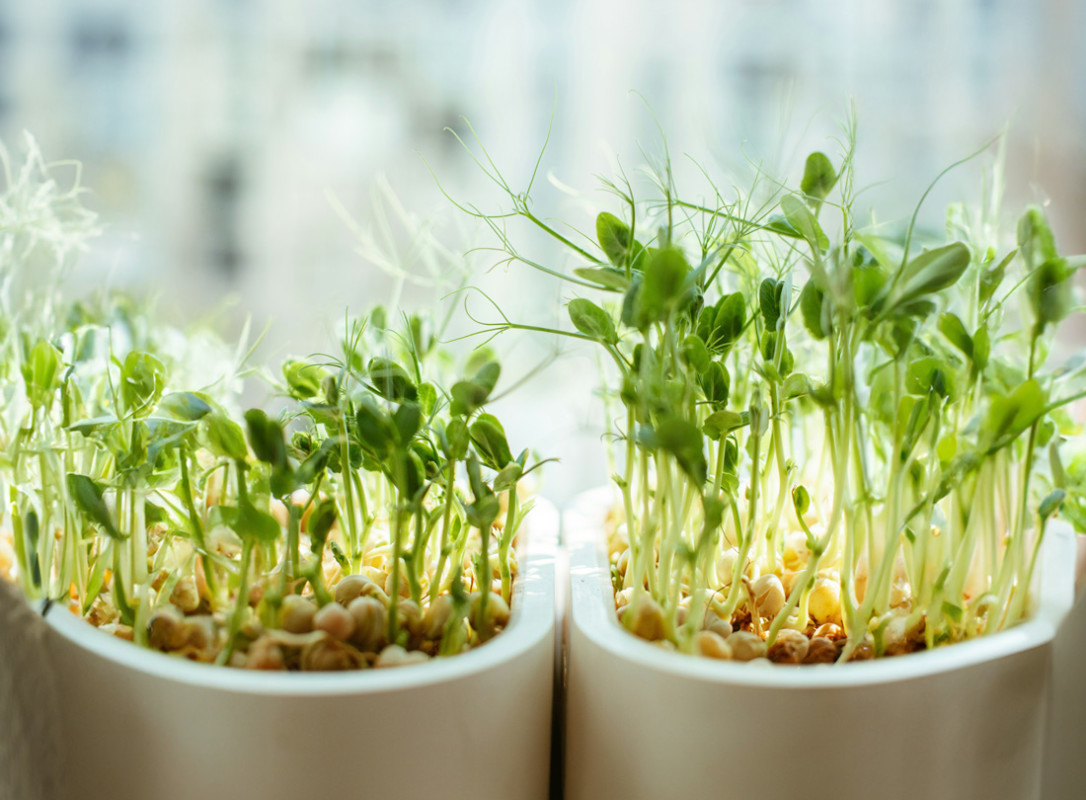We know all about the healthy virtues of green veggies, but there’s a reason you should be opting specifically for broccoli and broccoli sprouts benefits: a little-known nutrient called sulforaphane.
Etymologically-minded readers might have already noticed the link between the sulfur-y smell of the crucifer and this important phytonutrient. But sulforaphane isn’t just what made that overcooked cafeteria broccoli so, uh, unappetizing (or, as our sixth-grade selves said… farty.)
Sulforaphane: Immune Support Hero + Natural Detoxifier
Sulforaphane promotes and induces your body’s natural detoxing capabilities, and it also supports your immune system. Plus, it’s anti-inflammatory to boot.
Can someone get broccoli a cape? Because this is a real superfood.
(Don’t have time to cook up some broccoli sprouts right now? Check out these greens powders for a quick vitamin boost, or a wheatgrass shot for a speedy detox to start your day!)
Sulforaphane may not have gotten much press to date, but this has nothing to do with its powerful health benefits.
“Sulforaphane is not as widely known, as it influences complex mechanisms at the molecular level,” explains Brian Cornblatt, PhD, Medical Director at Nutramax Laboratories and Avmacol. “The phytochemical name is also quite complicated to say; it would be far easier to describe as ‘the health benefits of broccoli.’”
Say it with us: sul-for-a-phane. Good? Now let’s get down to brass tacks.
photo by Liza Golyarchuk on Upsplash
What is Sulforaphane?
Sulforaphane is not actually found in veggies, per se. Rather, as Cornblatt explains, this phytonutrient is produced in the body by its precursor, glucoraphanin, and the enzyme myrosinase.
“When we cook or chew broccoli,” explains Lisa Richards, nutritionist and founder of The Candida Diet, “there is a chemical process that occurs which results in sulforaphane.”
Sulforaphane’s Benefits
Digested that? Good! Because once your body has done the same, this compound offers more than a handful of health benefits, including improved metabolization and removal of potentially harmful chemicals in our bodies.
In particular, notes Dr. Elizabeth Trattner, A.P., sulforaphane can contribute to the eradication of carcinogens like benzene, which is found in solvents, pollution, and cigarette smoke. (Holy anti-cancer benefits, Batman! Er… broccoli!)
Gut Health Support
Sulforaphane can also downregulate key components involved in inflammation, thus contributing to a reduced risk of inflammatory diseases like metabolic disease, and diabetes. Much like Spirulina, this superhero is also known to reduce risk of cancer. And according to Richards, there is also some evidence that it can improve cognitive function, prevent diabetes, and protect against sun damage.
Lowered inflammation also translates to improved mood, Trattner explains, noting that one study of mice demonstrated that sulforaphane was as effective as Prozac for symptoms of depression.
(If you’re looking to support gut health in other ways, try reading about our favorite collagen supplements and the powerful benefits of marine collagen peptides.)
Immune Support
Last but certainly not least (especially these days…) sulforaphane also supports immune health (much like Chlorella…is anyone else noticing a trend with the color green?).
Early research has shown that it reduced the burden from a bacterial organism that is the leading cause of peptic ulcers, and the combo of fiber and sulforaphane “positively impacts the beneficial microorganisms that reside in our gastrointestinal tract,” according to Cornblatt.
“By promoting healthy bacterial growth through sulforaphane,” he continues,”inflammation can be tamed and our immune systems can be directed to other activities, such as keeping us protected from seasonal bugs and beyond.”
I’m In! So…How Do I Eat Broccoli Sprouts??
Sulforaphane is produced when we consume cruciferous vegetables, primarily broccoli. Richards notes that “it is strongly suggested heat kills the necessary enzyme to produce sulforaphane, making raw broccoli and other crucifers the best method to consume them.”
Photo by Quin Engle on Upsplash
Broccoli Sprouts vs Broccoli Florets?
Trattner adds that broccoli sprouts are an even better source of sulforaphane than broccoli florets. She notes that the principles of Traditional Chinese Medicine call for lightly steaming veggies for under four minutes for maximum nutrient absorption. This process, she explains, “keeps all the nutrients in but helps break down the cellulose and hemicellulose bands which can bloat you and give you gas.”
Broccoli + Broccoli Sprout Recipes
To best reap these benefits, then, try one (or several!) of the following recipes.
Unsplash Photo via Jordan Nix
1. Fish Tacos with Broccoli Slaw
This gluten-free taco recipe pairs spice-coated tuna with a creamy, yogurt-based broccoli slaw. Heaped in corn tortillas and topped with avocado, it’s an easy weeknight meal the whole family will love.
Images by Stephanie Gupana
2. Broccoli Rabe Crostini
Bitter broccoli rabe is the star of this easy-to-make appetizer spiked with a hint of chile flakes. Just barely sauté the veggies to ensure that they retain all of their wonderful health benefits.
Photo by Hanxiao via Unsplash
3. Takeout-Style Shrimp and Broccoli
Making your favorite Chinese takeout recipes at home ensures that you wield the control over ingredient quality and quantity. Keep the broccoli just this side of al dente, and pair it with sustainably caught shrimp in this delicious Chinese shrimp and broccoli recipe.
Image courtesy of the Minimalist Baker
4. Creamy Vegan Broccoli Salad
This broccoli salad is bursting with flavor and nutrients: salty sunflower seeds, sweet dried cranberries, and a zingy dressing made with cashew butter, maple syrup, and cider vinegar make this plant-based broccoli salad a real treat. Sprinkle on some homemade coconut bacon, and it’s ready to serve.
Image via 101 Cookbooks
5. Double Broccoli Buddha Bowl
Broccoli is married with rich coconut oil and spicy green curry paste in this buddha bowl topped with almonds for crunch. Consider garnishing with broccoli sprouts for a pretty garnish that adds lovely texture and even more sulforaphane-producing glucoraphanin.
Related on Organic Authority
Image courtesy of Organic Authority
6 All Natural Immune Boosters
The Beginner’s Guide to Sprouting: Where to Start and How to Finish
All You Ever Wanted to Know About Broccoli Nutrition (Plus: Fun Facts!) – Discover the Vegetable Formerly Known as ‘Italian Asparagus’
Source link








